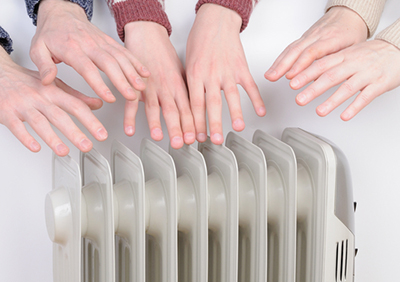
(Photo: via Shutterstock)
Don’t expect fracking to keep you warm this winter.
Thanks to the fracking boom, the United States is expected to surpass Russia and Saudi Arabia as the world’s top natural gas producer this year, but the federal government expects the average cost of heating a home with gas over the winter season will be 13 percent higher than last winter.
The average cost of heating a home with gas will be below the previous five-year average, but prices spiked last year as well, according to the Energy Information Administration. The average cost of heating a home with propane will rise 9 percent.
The oil and gas extraction technique known has fracking has changed rural landscapes across the country, igniting one of the nation’s most heated environmental debates, and fossil fuel firms are now sitting on massive reserves of natural gas from underground shale formations across the country.
Despite the abundance, many Americans still struggle to heat their homes during the winter, and millions receive heating government assistance from a federal program that has suffered deep cuts.
Since 2010, the annual federal funding for home heating assistance was cut from $5.1 billion to about $3.4 billion, according the National Energy Assistance Directors’ Association. Despite the cuts, nearly 9 million Americans relied on assistance in 2012.
Meanwhile, profit-hungry industries are engaged in a high-profile debate over proposals to export massive amounts of America’s natural gas to overseas markets.
There are 21 export terminals currently awaiting approval from the Department of Energy (DOE), which has already approved four export terminals, including three this year.
In August, DOE approved an export facility in Lake Charles, Louisiana, which would export up to 2 billion cubic feet of liquefied natural gas a day. Just over a month later, the DOE gave the green light to Dominion Resources Inc. to build a terminal on Maryland’s Chesapeake Bay expected to export 770 million cubic feet of liquefied gas each day.
Industrialists eager to cash in on fracking exports are hoping the DOE’s swift movement on the most recent export terminals signals that there will soon be more to come. Exports, they argue, will create jobs and help the United States compete more in international markets.
More than half of Americans heat their homes with natural gas, but household consumers are not among the loudest critics of plans to export massive amounts of fracked gas to other countries. Heavy industries that rely on natural gas for power and chemical processing create a huge demand for the resource. Natural gas is expensive to transport, and there are only so many pipelines and processing facilities to deliver the product. That’s why heating costs will go up this winter despite the natural gas glut, and it’s also why big corporations like Dow Chemical have formed America’s Energy Advantage (AEA), a coalition to oppose a significant expansion of natural gas exports.
Last month, AEA challenged the DOE’s proceedings over the next export terminal on the federal docket and has demanded a more formal rulemaking process, based on current data on supply and demand. The current guidelines for the application review, the group argues, were drawn up in the 1980s.
“We felt the need to file a formal motion because American consumers of natural gas deserve as much say in the process as producers,” said AEA chair Jennifer Diggins.
But the AEA does not represent everyday American consumers facing higher heating bills this winter. Diggins also happens to be the public affairs officer of Nucor, a steel company that joined Dow and other chemical and manufacturing companies at the AEA to oppose a government policy of unlimited natural gas exports that would undermine their access to the cheap gas provided by the fracking boom.
Dave Schryver, vice president of the American Public Gas Association, the only AEA member that is not a manufacturer, said that increasing natural gas exports would raise domestic prices. Schryver said higher prices would discourage technological innovation and slow the current “manufacturing renaissance” that is creating jobs.
When asked if household consumers have benefited from the surplus from fracking, Schyver said that prices were higher and more unstable before shale gas hit the market.
But residential gas prices have steadily risen over the past two years as deep cuts to the federal home heating assistance are threatening to leave millions of Americans in the cold.
Join us in defending the truth before it’s too late
The future of independent journalism is uncertain, and the consequences of losing it are too grave to ignore. To ensure Truthout remains safe, strong, and free, we need to raise $33,000 in the next 2 days. Every dollar raised goes directly toward the costs of producing news you can trust.
Please give what you can — because by supporting us with a tax-deductible donation, you’re not just preserving a source of news, you’re helping to safeguard what’s left of our democracy.